We want to be firefighters
Women who wish to join the Madrid service complain of discrimination; the city sets the same physical tests for men and women, despite their different strengths
Natalia Baza wants to join the Madrid fire department. One obstacle stands in her way. It's called the "110-meter sprint with weights." This is the test faced by all hopefuls applying for 220 new positions in the capital. It's a nightmare shared by the four other women applicants, all with sinewy bodies bearing witness to a punishing training regime.
The trial consists of running 10 meters, picking up two six-kilo weights and running another 100 meters, all within 18 seconds. If you fail, you're out. In the words of 29-year-old Baza, the test is "unreachable" and "impossible" for a woman, however hard she trains.
The aspiring firefighters insist that no woman - and very few men - can pass the trial. And for that reason they believe Madrid's exam is discriminatory, particularly when most other cities have different tests for men and women.
The capital has 1,500 firefighters on their staff. Only two of them are women but they are known as "firefighter drivers," as opposed to "specialist firefighters." In other words, they only drive; they don't take part in emergency rescues. Baza believes she could pass the test to be a driver. "But it's not the same work. I want to be a firefighter," she insists.
Both Baza and another candidate, who preferred to be identified by her initials, M. S., consider themselves to be a cut above the rest physically. They are athletes. But even so, they cannot get a place on Madrid's fire service. "Something is going wrong when there is not a single female firefighter here," she says. They feel City Hall does not want them in the department. The council denies it, but admits that the physical tests don't exactly make it easy.
"It's true that the 110-meter test is harder for women," says Emergencies chief Alfonso del Alamo. "All the strength tests are harder for women than men. Their muscular strength is infinitely lower; that is an inescapable fact," he adds.
This is the first year that the fire service has set tests that reflect the work of a firefighter. Obstacle courses have replaced the generic 100-meter sprint. "We value the ability to carry out certain tasks. They are tasks that don't require discrimination by sex."
The women see things differently. "Before I thought that equality was about doing the same things as men, but now I realize that it's about having the same opportunities," says Baza. Although the council are unwilling to make distinctions by sex, they do seem to acknowledge they may have gone too far with the 110-meter trial. "I don't rule out the possibility that the panel may add a second to the final time," says Alamo.
"I would be lying if I said I want women to join," admits the director. "What I want is people with reasonable physical ability."
The female candidates defend their abilities: "This is team work, where we all have strengths and weaknesses. It's not all about brute force. I have advantages: I use less air with the breathing kit, I can get into small spaces, like into a crashed car," says M. S..
Male firefighters like Juan Andrés González, UGT union representative, adds another female virtue to the list: "In the last recruitment drives, for over 40 percent of men, firefighting was not a true vocation like it is for them," he said. Both women are working in emergency services already, and train for hours every day in preparation for the Madrid public exams.
Firefighters - both men and women - don't get tested again after getting a place on the service.

Tu suscripción se está usando en otro dispositivo
¿Quieres añadir otro usuario a tu suscripción?
Si continúas leyendo en este dispositivo, no se podrá leer en el otro.
FlechaTu suscripción se está usando en otro dispositivo y solo puedes acceder a EL PAÍS desde un dispositivo a la vez.
Si quieres compartir tu cuenta, cambia tu suscripción a la modalidad Premium, así podrás añadir otro usuario. Cada uno accederá con su propia cuenta de email, lo que os permitirá personalizar vuestra experiencia en EL PAÍS.
¿Tienes una suscripción de empresa? Accede aquí para contratar más cuentas.
En el caso de no saber quién está usando tu cuenta, te recomendamos cambiar tu contraseña aquí.
Si decides continuar compartiendo tu cuenta, este mensaje se mostrará en tu dispositivo y en el de la otra persona que está usando tu cuenta de forma indefinida, afectando a tu experiencia de lectura. Puedes consultar aquí los términos y condiciones de la suscripción digital.




























































